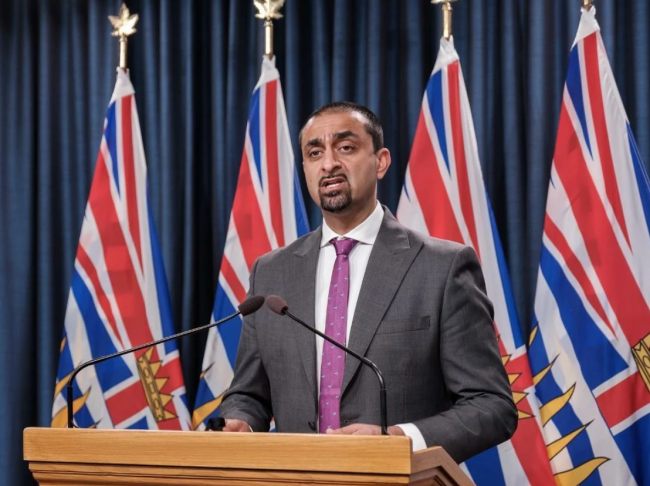Articles Menu

Sept. 4, 2024
[Editor’s note: This is the latest in an occasional series by Mo Amir called Logic Check, whose focus is explained in a sidebar to this article.]
Earlier this year, B.C. Housing Minister Ravi Kahlon admitted that vacancy control protects vulnerable renters from British Columbia’s exploitive rental market.
It was a low-key about-face from an NDP government that has repeatedly disappointed over 100,000 B.C. households at risk of homelessness by insisting that vacancy control measures are not in its housing policy tool box.
“We are not contemplating vacancy controls,” Kahlon told the Union of BC Municipalities conference in September 2023.
The housing minister praised vacancy controls as “protecting vulnerable people who are being exploited by some bad faith actors who are using pressure tactics on tenants to leave their rental units so they can hike the rent.”
Otherwise, the BC NDP wants British Columbians to memory-hole vacancy control, as if it were Anjali Appadurai (... who?).
After all, B.C. already has rent control. What more do you want, serf?
Rent control without vacancy control
If rent control is a placemat, then vacancy control is a tablecloth.
Currently, B.C.’s rent control policy limits how much landlords can raise their (existing) tenants’ rent each year. In contrast, vacancy control would limit how much landlords can raise the rent of their rental property each year. Rent control applies to tenancy agreements; vacancy control applies to the unit of housing itself.
Imagine two identical, side-by-side apartments in the same 30-year-old building in Vancouver: same floor, same layout, same square footage, same condition.
One rents for $2,000 per month. The other rents for $2,700.
The tenant of the $2,000 unit has lived there since 2019, benefiting from B.C.’s rent control rules, since the BC NDP government has set the maximum allowable rent increase on existing tenancy agreements at, or below, inflation since 2018.
The tenant of the more expensive unit just moved in yesterday. Their rent was at the mercy of Vancouver’s rental market — the most expensive in the country — where rents have increased by up to 23 per cent each year in major metropolitan areas since 2019.
If B.C. had vacancy control from 2019 onwards, the tenant who moved in yesterday would pay the same rent as their neighbour who moved into the building five years ago.
Furthermore, without vacancy control, landlords are incentivized to make bad-faith evictions in the pursuit of higher rent, according to Kahlon himself, just this year.
Nevertheless, the NDP government repeatedly rebuffed vacancy control because it was excluded from the recommendations of a Rental Housing Task Force report produced six years ago. Meanwhile, the average rent for a newly listed one-bedroom unit in Vancouver increased $706 per month, or about 37 per cent, from 2019 to 2024.
But vacancy control kills rental construction!
The outrage machine of a landlord class demanding a guaranteed positive cash flow often bends the ear (and logic) of a government where more than a fifth of B.C. MLAs are themselves landlords and fewer than five per cent are renters.
Even as homelessness rapidly increases throughout B.C., the government rejects vacancy control, while weirdly adopting the reasoning of landlords who profit off the province’s rental crisis.
The government argues that vacancy control would reduce affordable rental stock and deter the construction of new housing supply. Recently, Premier David Eby wielded the same argument.
Not only is this the same, tired argument used by landlords against vacancy control, but it’s also the same, tired hand-waving from landlords opposed to the NDP’s current form of rent control.
In 2018, a LandlordBC report claimed that current rent controls would critically undermine the supply of rental housing.
However, rental construction in B.C. increased.
In 2022, B.C. registered a record number of purpose-built rental homes. In 2023, B.C. set a new annual record for purpose-built rental homes with 30 per cent more registered rentals than in 2022. In the first seven months of this year, the number of registered rental units is still up 0.5 per cent from the same period last year.
Moreover, under vacancy control, new market rentals have no limit on setting initial rent prices.
The purpose of vacancy control is to preserve older, affordable housing units. The NDP fundamentally understands this; otherwise they would have never implemented vacancy control for SROs in Vancouver’s Downtown Eastside. While the government may argue that this particular neighbourhood was in crisis, thus warranting vacancy control, the reality is that the entire province is in a rental crisis, which is what spurred the demand for vacancy control in the first place.
Won’t someone think of Dave Barrett?
As the BC General Employees’ Union noted in its 2023 report advocating for vacancy control, vacancy control is neither a new nor an unpopular idea in British Columbia.
For about 10 years up until 1983, B.C. had vacancy control to protect renters from price gouging in a rental market hallmarked by high inflation and low vacancies (sound familiar?). Introduced by the province’s first NDP premier, Dave Barrett, vacancy control was so popular that the following Social Credit premier, Bill Bennett, kept the policy for his next two terms. Bennett did water down the measure before eventually scrapping it in 1983, which — contrary to the logic that vacancy control kills rental construction — did not result in a boom of new rental construction.
And yet, even as municipal governments, the BC General Employees’ Union and, of course, vulnerable renters clamour for vacancy control — in an election year, to boot — the NDP remains resolute in contradicting itself.
The BC NDP will pat itself on the back for adopting vacancy control in one neighbourhood of vulnerable renters, while rejecting the policy for a province of vulnerable renters.
[Top photo: BC NDP Housing Minister Ravi Kahlon has (selectively) admitted vacancy controls tame an exploitive rental market and his ministry applied them to SROs. Photo via BC government.]